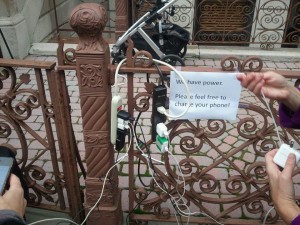Charity, proof scarcity doesn't always increase prices.
 Economic theory states that scarcity increases prices; but, exactly the opposite occurs. People share with their neighbors.
Economic theory states that scarcity increases prices; but, exactly the opposite occurs. People share with their neighbors.
Widespread power outages is the definition of scarcity. The people people without electricity clearly have a need. Why didn’t it lead to massive profit taking? In a real free market there is another choice, it’s call charity.
The person sharing their electricity didn’t have a scarcity, they had an abundance, more than they needed. The value of helping people in need outweighed any monetary profit or the hassle involved in selling access to electricity. This situation shows that given the choice people gladly share. If there isn’t a significant cost involved sharing people will share.
Learn how to program a robotic car in 7 weeks
Two years ago in “Why We Don’t Have Flying Cars, Yet” I explained why automation is the next big innovation for vehicles, not alternative energy.
Standford is offering a 7 week undergraduate class teaching how to program a self-driving car. Automation improves the under-satisfied outcome of cars but it is also technologically easier to make than low-cost long range batteries for an electric car.
The Predictive Innovation report the video was based on was first offered to GM but they turned it down. European and Asian car companies used the information and are now selling cars with automated driving features.
 Volvo’s XC60 has a City Safety feature that automatically brakes to prevent crashes. It’s a pure gasoline car with lots of room and power. It is priced about the same as the Chevy Volt, although doesn’t receive any of the government incentives.
Volvo’s XC60 has a City Safety feature that automatically brakes to prevent crashes. It’s a pure gasoline car with lots of room and power. It is priced about the same as the Chevy Volt, although doesn’t receive any of the government incentives.
| 2011 US Car Sales | |
| Car | Units Sold |
| Chevy Volt | 7,671 |
| Volvo XC60 | 12,932 |
The Volvo XC60 with City Safe automatic braking sold 68% more cars in the USA than Chevy Volt. So not only was it easier to build, and thus more profitable, it sold more units. The automated car is more desirable to customers. One of the key points of the report was to offer incremental improvements with meaningful value to customers. That made sure the new features were high quality and low cost.
In addition to satisfying safety, automated cars are better for the environment than an electric car. Electric cars just shift the source of pollution from burning gasoline in the car to burning coal at a power plant. Automated cars use less energy.
First, replacing or repairing a car damaged in an accident uses more energy than the car ever will from driving it. And how can you count the cost of injuries and deaths?
Secondly, by reducing traffic congestion automated cars can save energy for all the cars on the road while reducing drive times and frustration.
Automation in vehicles is still a big innovation opportunity.
Abundance Based Intellectual Property System
The intended purpose of intellectual property laws is to promote discovery and encourage sharing of ideas. A system that rewards great discoveries and also makes the realization of the ideas available to as many people as cheaply as possible is the ideal system. Using the concepts of Abundance that system can be achieved.
The patent and copyright system creates artificial scarcity. Its stated goal is to promote the sharing of ideas but it does not work. Its not just broken, it was wrong from the start. It assumes that good ideas are scarce and the only way to get people to share their ideas is to give them a monopoly, creating a temporary scarcity.
It’s absurd to claim information as property. If someone said they owned the number 3 and no one can use it without their permission, they would be laughed at or even locked up for being insane. The patent and copyright system grants ownership to information. That contradicts the goal of promoting discovery and sharing.



 Predictive Innovation Training
Predictive Innovation Training Predictive Innovation: Core Skills Book
Predictive Innovation: Core Skills Book RoundSquareTriangle.com
RoundSquareTriangle.com